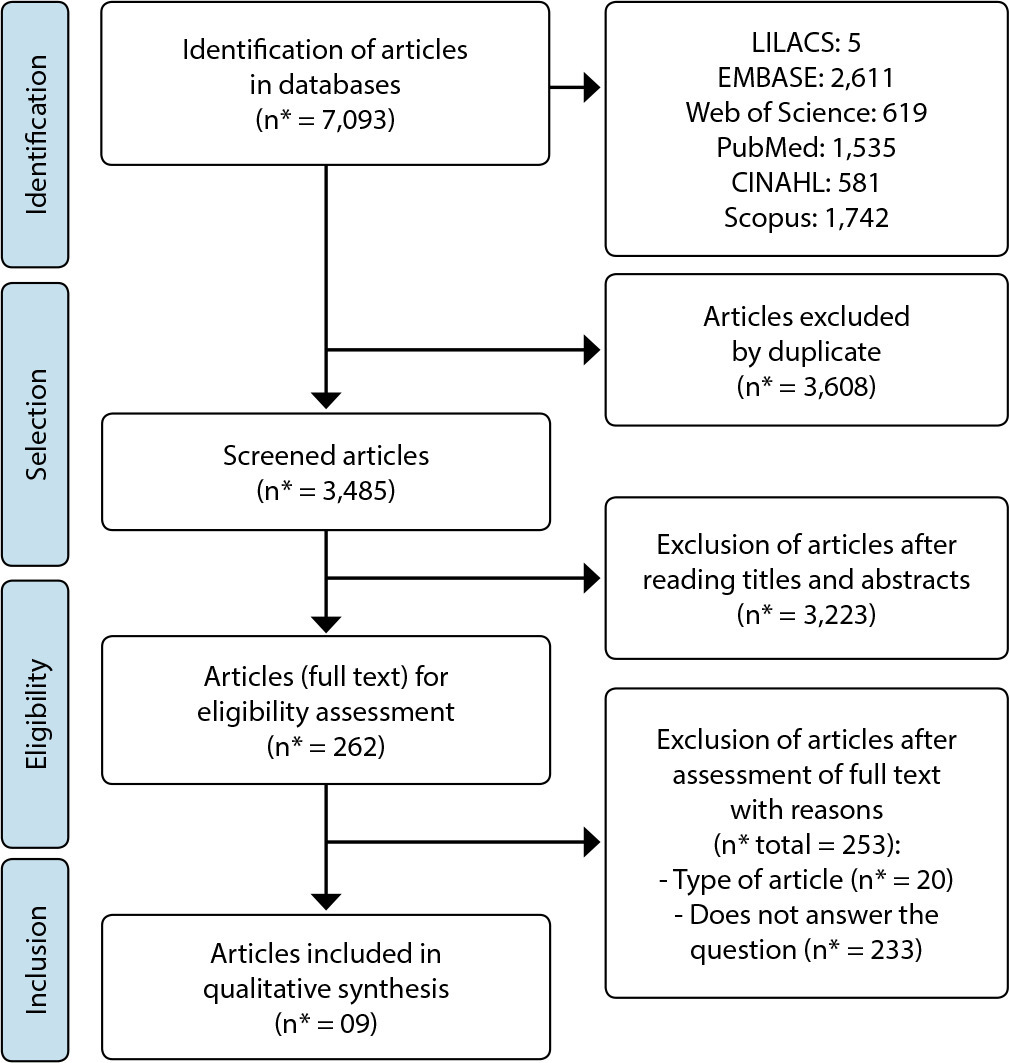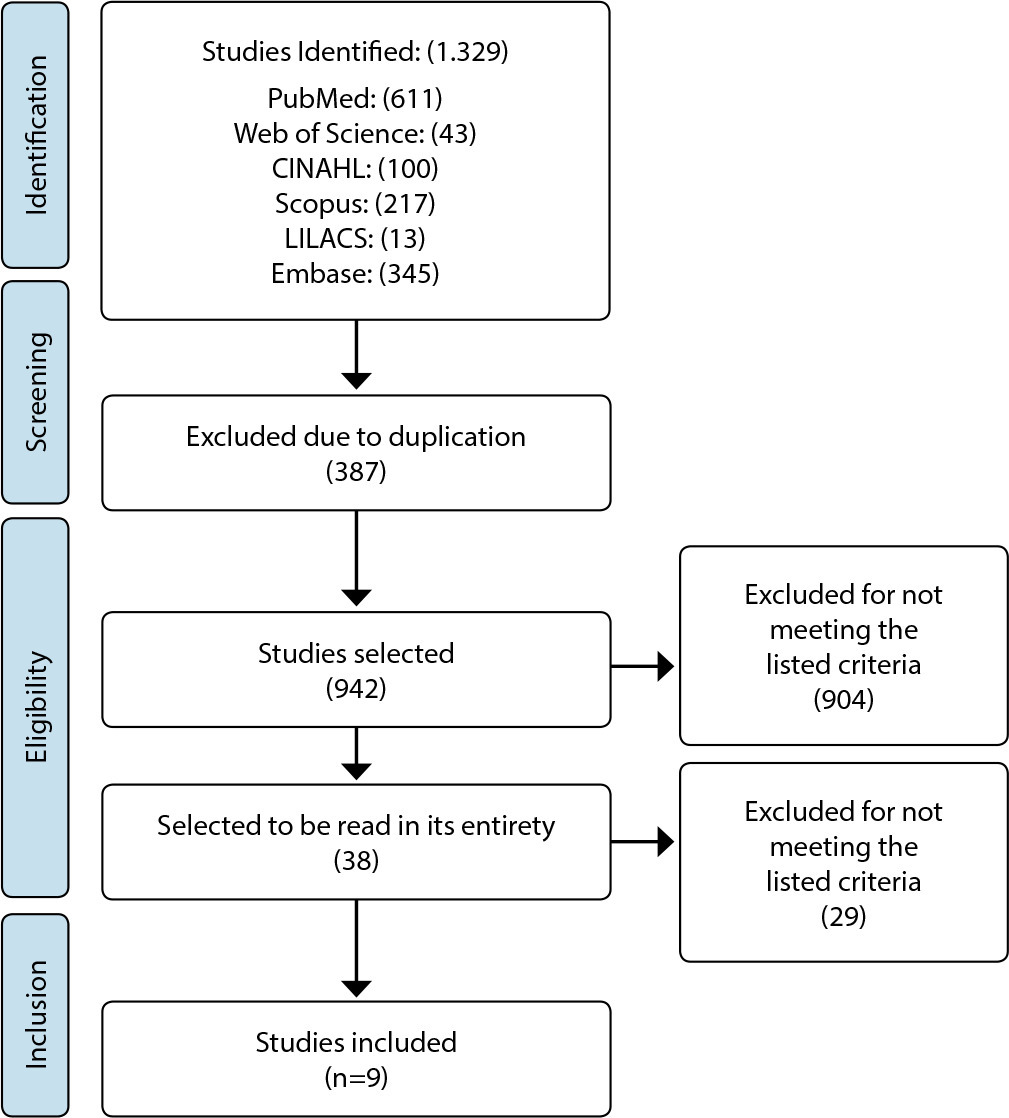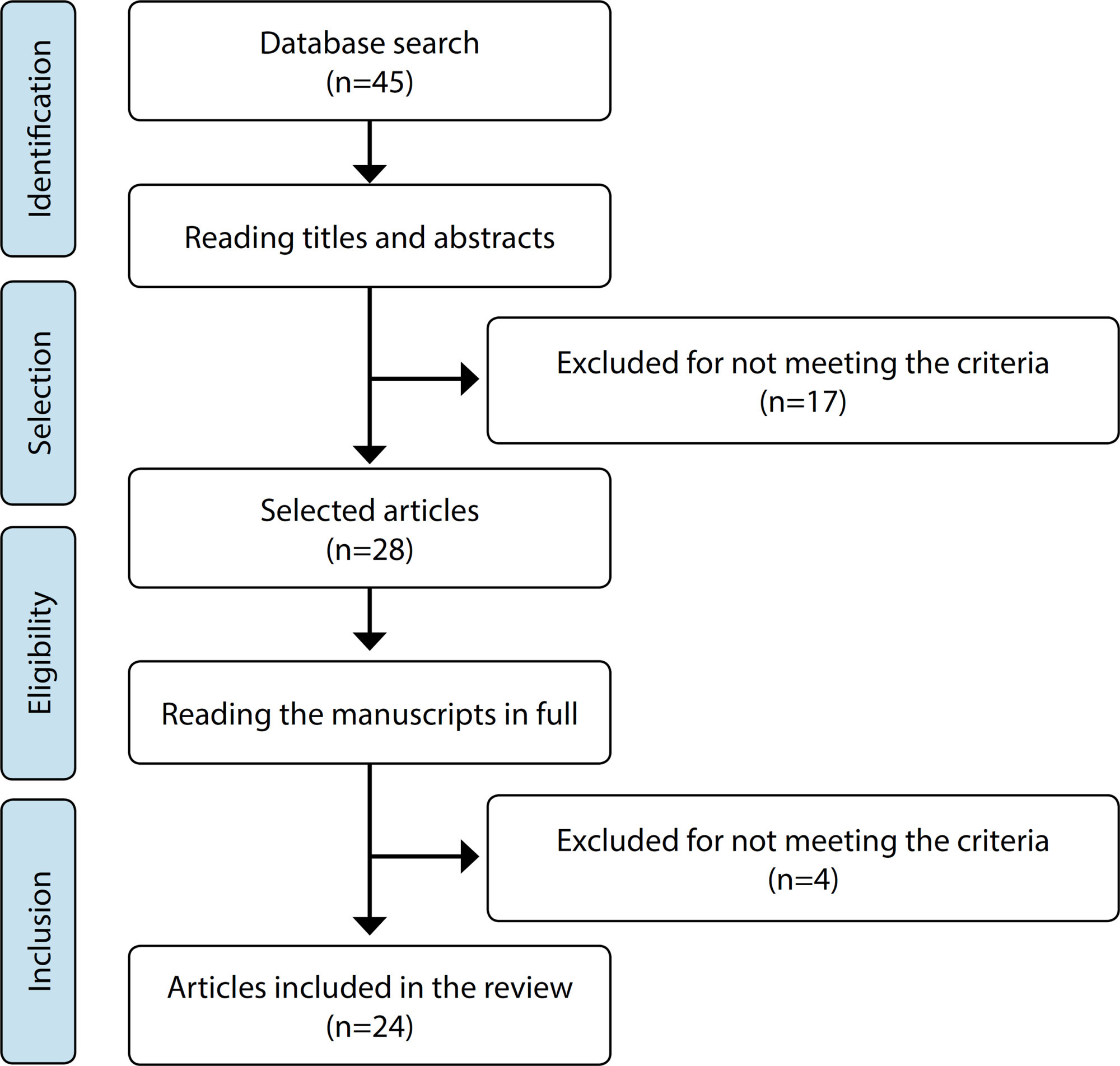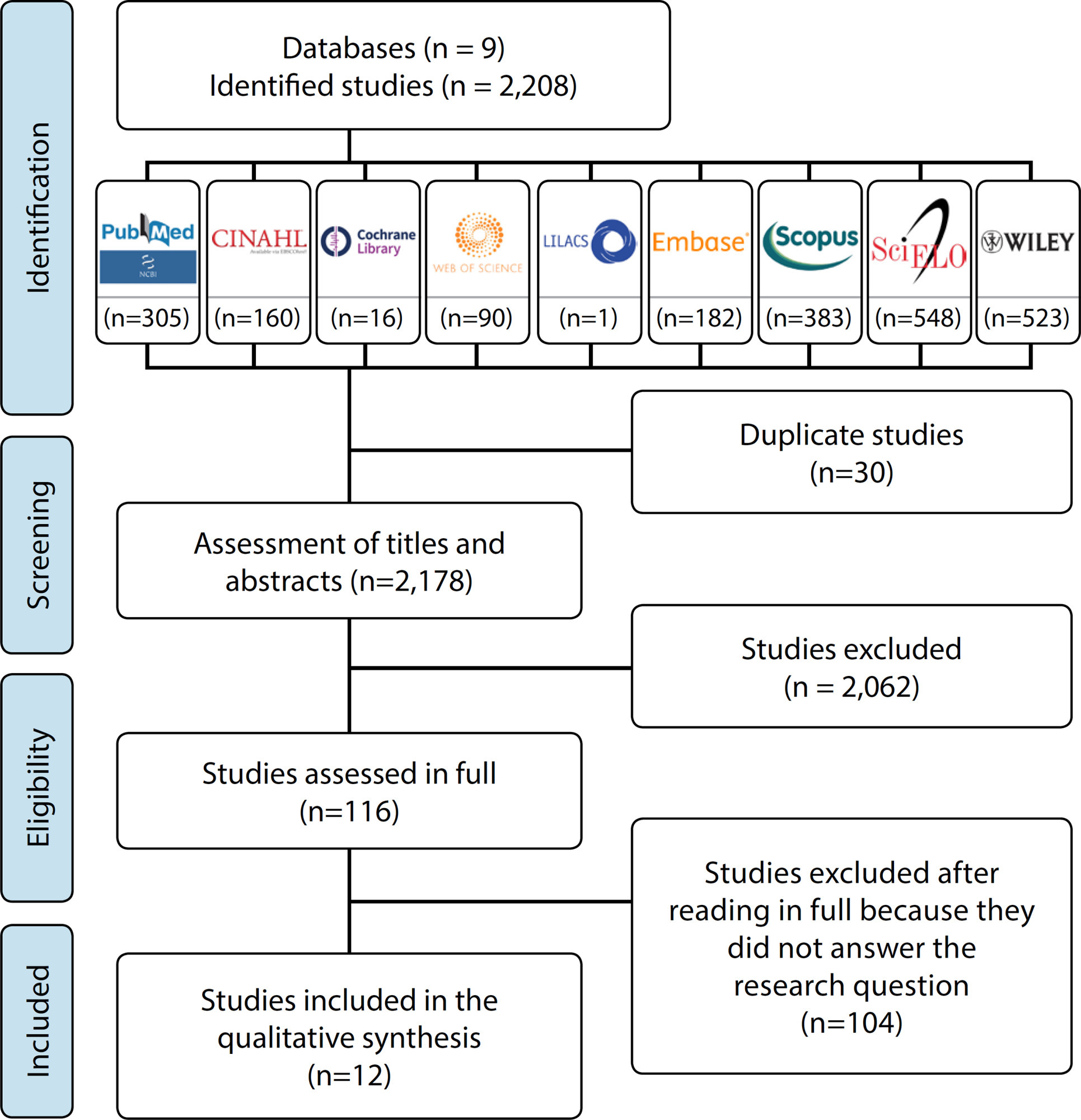-
ORIGINAL ARTICLE09-19-2022
Implications of health conditions on rural soybean workers’ quality of life
Revista Brasileira de Enfermagem. 2022;75:e20210983
Abstract
ORIGINAL ARTICLEImplications of health conditions on rural soybean workers’ quality of life
Revista Brasileira de Enfermagem. 2022;75:e20210983
DOI 10.1590/0034-7167-2021-0983
Views0See moreABSTRACT
Objective:
to analyze the implications of health conditions on rural workers’ quality of life in the context of soybean production.
Method:
a cross-sectional study, with an intentional sample of 299 male rural workers. Data collection took place between October and December 2019. The following instruments were used: World Health Organization Quality Life-bref; Rural Workers’ Living & Health Conditions questionnaire; International Physical Activity Questionnaire; Cut down, Annoyed, Guilty, and Eye-opener. They were analyzed via descriptive and inferential statistics, using bivariate (Mann-Whitney; Kruskal-Wallis) and multivariate tests (generalized additive models for location, scale and shape).
Results:
the presence of a diagnosis of morbidity, alcohol dependence, occupational accidents and absenteeism implied a decrease in workers’ quality of life scores.
Conclusion:
the existence of unfavorable health conditions has a negative impact on rural soybean workers’ quality of life.
-
ORIGINAL ARTICLE09-09-2022
Palliative care management by caregivers in home care: theoretical validation in a conversation circle
Revista Brasileira de Enfermagem. 2022;75(6):e20210737
Abstract
ORIGINAL ARTICLEPalliative care management by caregivers in home care: theoretical validation in a conversation circle
Revista Brasileira de Enfermagem. 2022;75(6):e20210737
DOI 10.1590/0034-7167-2021-0737
Views0See moreABSTRACT
Objectives:
to present the validation process of a Grounded Theory on the management of palliative care at home by a caregiver of a family member who experiences a death/dying process.
Methods:
a qualitative, explanatory research, which validated a theoretical matrix through a conversation circle containing 15 family caregivers and nine healthcare professionals, in December 2018.
Results:
forty-six propositions were validated regarding family caregivers’ contextual, causal, intervening conditions, consequences and action strategies to deal with the dying and death process of a family member. Conversation circles encouraged dialogue and (re)signification of the senses and knowledge of those involved, proving to be a way of educating and promoting the exercise of citizenship by participants.
Final Considerations:
the conversation circle made it possible for participants to interact and share information and experiences regarding home care for palliative patients and their families.

-
ORIGINAL ARTICLE09-09-2022
Primary care nurses’ learning styles in the light of David Kolb
Revista Brasileira de Enfermagem. 2022;75(6):e20210986
Abstract
ORIGINAL ARTICLEPrimary care nurses’ learning styles in the light of David Kolb
Revista Brasileira de Enfermagem. 2022;75(6):e20210986
DOI 10.1590/0034-7167-2021-0986
Views0See moreABSTRACT
Objectives:
to identify primary care nurses’ learning styles in the light of David Kolb’s Experiential Learning Theory.
Methods:
a descriptive and exploratory qualitative study. A semi-structured interview script was used for data collection and content analysis for data processing.
Results:
primary care nurses showed different learning styles: diverging, which combines active experimentation and reflective observation; assimilating, which combines reflective observation and abstract conceptualization; converging, which associates abstract conceptualization and concrete experience; and accommodating, which unites concrete experience and active experimentation.
Final Considerations:
learning through experience requires that knowledge be understood and transformed. Nurses learn in different ways, as they have different learning styles. Therefore, recognizing nurses’ learning styles is important to foster ongoing professional development and ensure safe nursing care.
-
REVIEW09-09-2022
Factors associated with inadequate treatment of syphilis during pregnancy: an integrative review
Revista Brasileira de Enfermagem. 2022;75(6):e20210965
Abstract
REVIEWFactors associated with inadequate treatment of syphilis during pregnancy: an integrative review
Revista Brasileira de Enfermagem. 2022;75(6):e20210965
DOI 10.1590/0034-7167-2021-0965
Views0See moreABSTRACT
Objectives:
to analyze the evidence available in literature on factors associated with inadequate treatment of syphilis in pregnant women.
Methods:
an integrative review, carried out in the LILACS, CINAHL, Web of Science, Scopus, PubMed and EMBASE databases, with controlled descriptors therapeutic and prenatal syphilis.
Results:
nine publications composed the interpretative analysis, in which low education, income and maternal age, temporary lack of medication and HIV infection were associated with inadequate treatment of syphilis during pregnancy, in addition to delay or absence of prenatal care and receiving the 1st dose of penicillin, lack of tests or treatment less than 30 days before childbirth, and partners’ low compliance with treatment.
Final Considerations:
among the main factors associated with inadequate treatment, clinical and sociodemographic aspects stand out, as well as failures in drug dispensing, prescription and monitoring of treatment of pregnant women and their partners by the health system.

-
REVIEW09-09-2022
Medical adhesive-related skin injury in adult intensive care unit: scoping review
Revista Brasileira de Enfermagem. 2022;75(6):e20210926
Abstract
REVIEWMedical adhesive-related skin injury in adult intensive care unit: scoping review
Revista Brasileira de Enfermagem. 2022;75(6):e20210926
DOI 10.1590/0034-7167-2021-0926
Views0See moreABSTRACT
Objectives:
to identify and synthesize scientific evidence on preventing medical adhesive-related skin injuries in adult intensive care patients.
Methods:
this is a scoping review based on PRISMA-ScR recommendations and the technique proposed by Joanna Briggs Institute. PubMed, CINAHL, Web of Science, Scopus, LILACS, and Embase databases were searched using “Injuries AND Adhesives AND Skin AND Medical” descriptors”.
Results:
1,329 studies were identified, and after analysis, the final sample consisted of nine articles. We obtained two experts’ consensus, three case studies, two cross-sectional studies, one prospective cohort study, and one literature review regarding the type of studies.
Final Considerations:
the synthesized evidence allowed us to list health care measures to prevent medical adhesive-related skin injuries. The professional must know how to identify the skin injuries associated with medical adhesives and the main strategies for their prevention.

-
REVIEW09-06-2022
Religiosity and mental health as aspects of comprehensiveness in care
Revista Brasileira de Enfermagem. 2022;75(1):e20201011
Abstract
REVIEWReligiosity and mental health as aspects of comprehensiveness in care
Revista Brasileira de Enfermagem. 2022;75(1):e20201011
DOI 10.1590/0034-7167-2020-1011
Views0See moreABSTRACT
Objective:
to understand how religiosity can influence the health of individuals diagnosed with mental disorders, based on comprehensive care.
Methods:
this is an integrative literature review, with the inclusion of articles in Portuguese, English and Spanish, between 2010 and 2018.
Results:
the critical analysis and qualitative synthesis of the 24 selected studies were categorized into two subtopics: The influence of religiosity in promoting comprehensive mental health care; Mental health versus religiosity: influencing conditions for effective access to comprehensive care.
Final considerations:
a positive influence of religiosity was identified in the lives of individuals diagnosed with mental disorders; however, evidence shows that health teams do not feel comfortable and prepared to work with religiosity as an expression of spirituality. This being one of the dimensional aspects of health, it can be inferred, on the results, the existence of this gap in the comprehensive care approach.

-
REVIEW09-06-2022
Biosafety measures to prevent COVID-19 in healthcare professionals: an integrative review
Revista Brasileira de Enfermagem. 2022;75(1):e20201191
Abstract
REVIEWBiosafety measures to prevent COVID-19 in healthcare professionals: an integrative review
Revista Brasileira de Enfermagem. 2022;75(1):e20201191
DOI 10.1590/0034-7167-2020-1191
Views0See moreABSTRACT
Objective:
to identify the main biosafety measures for preventing COVID-19 in healthcare professionals.
Methods:
this is an integrative literature review, with studies published between January and July 2020, on the MEDLINE/PubMed, Scopus, Embase, Web of Science, LILACS, SciELo, Wiley Online Library, Cochrane CINAHL databases. The selection of studies followed the PRISMA recommendations.
Results:
among the 2,208 publications identified, 12 studies comprised the sample, which enabled the analysis in four thematic categories: The importance of using recommendations about the use of personal protective equipment; The restructuring of new operational and clinical routines and flows in the practice of services; Monitoring professionals, especially testing; Conducting training.
Conclusions:
the phenomena involved are innumerable, covering operational management and the training of teams to deal with highly infectious pathogens and disease outbreaks.

-
ORIGINAL ARTICLE09-06-2022
(Lack of) knowledge of mothers about sickle cell trait and disease: a qualitative study
Revista Brasileira de Enfermagem. 2022;75(1):e20201217
Abstract
ORIGINAL ARTICLE(Lack of) knowledge of mothers about sickle cell trait and disease: a qualitative study
Revista Brasileira de Enfermagem. 2022;75(1):e20201217
DOI 10.1590/0034-7167-2020-1217
Views0See moreABSTRACT
Objective:
to analyze the understanding of mothers about sickle cell disease and/or trait of the family from a diagnosed child.
Methods:
this is a qualitative study, using a semi-structured interview with 23 mothers, at a sickle cell disease outpatient clinic of a public institution, from October to December 2017. Analysis was thematic.
Results:
all participants had sickle cell trait as well as the parents of their children. Twenty children were diagnosed with sickle cell disease by Heel Prick Test, and three, after hospitalization due to the disease. Most did not know how to report the presence of the trait or disease in relatives other than nuclear.
Final considerations:
diagnosis cannot be restricted to the result of neonatal screening, requiring that preventive information on sickle cell crises be reinforced. It is recommended to search for other affected relatives to learn about their genetic condition, reflecting on their reproductive decisions.
-
ORIGINAL ARTICLE01-01-2019
The Brazilian Army nurses’ uniforms: visual identity in World War II
Revista Brasileira de Enfermagem. 2019;72(1):111-117
Abstract
ORIGINAL ARTICLEThe Brazilian Army nurses’ uniforms: visual identity in World War II
Revista Brasileira de Enfermagem. 2019;72(1):111-117
DOI 10.1590/0034-7167-2018-0414
Views1See moreABSTRACT
Objective:
To analyze the symbolic effects of the official military uniform of the nurses from Brazilian Army in World War II.
Method:
This research was developed using the historical method, with iconographic sources. The data were discussed based on the concepts of the social world theory, by Pierre Bourdieu.
Results:
The images selected demonstrate the own meaning of the uniforms, evidencing the functions and the social position of those who wear it, being private and obligatory to use it in the military field.
Final considerations:
In the case of the nurses from the Brazilian Expeditionary Force, the appropriation of uniforms promoted the visual communication representing military nurse in the context of war, at the same time it served for distinction purposes in the army, but not necessarily in the nursing field. Symbolically, they remained amongst the walls of the barracks even after the end of the war and, thus, they remained unknown and marked by the symbols of forgetfulness.

-
REFLECTION01-01-2019
The concept of vulnerability applied to Healthcare-associated Infections
Revista Brasileira de Enfermagem. 2019;72(1):299-303
Abstract
REFLECTIONThe concept of vulnerability applied to Healthcare-associated Infections
Revista Brasileira de Enfermagem. 2019;72(1):299-303
DOI 10.1590/0034-7167-2017-0584
Views1See moreABSTRACT
Objective:
To discuss the potentialities of using the concept of vulnerability to support measures for preventing and controlling healthcare-associated infections (HAIs).
Methods:
This theoretical study was conducted in steps: 1) presentation of markers that frame the concept of vulnerability; 2) presentation of the characteristics of the health events to which the concept of vulnerability is intended to be applied; 3) identification of research gaps that could be potentially filled by using the concept of vulnerability; 4) identification of the potentialities of using the concept of vulnerability to deal with HAIs.
Results:
Proposal of a framework for analyzing HAIs from a vulnerability perspective, including the individual and collective dimensions.
Conclusion:
Using the concept of vulnerability to study and deal with HAIs favors a new approach to an old problem, unlike the dominant studies that highlight the individual aspects of the practices in healthcare services.
-
REFLECTION01-01-2019
Operationality of concepts in Heideggerian phenomenological investigation: epistemological reflection on Nursing
Revista Brasileira de Enfermagem. 2019;72(1):304-308
Abstract
REFLECTIONOperationality of concepts in Heideggerian phenomenological investigation: epistemological reflection on Nursing
Revista Brasileira de Enfermagem. 2019;72(1):304-308
DOI 10.1590/0034-7167-2017-0941
Views1See moreABSTRACT
Objective:
To describe the investigative path of analysis and the operationality of concepts based on Martin Heidegger’s theoretical and philosophical framework.
Method:
Theoretical reflection on the phenomenon of pregnancy in a woman with heart disease.
Results:
Stages of the investigative movement were evidenced based on the pre-reflection related to the object of study and to the search for the phenomenal meaning, using the existential and analytical Hermeneutics as the approach and resulting in the reach of the phenomenal totality.
Conclusion:
The worldview of the researcher, who considered the subjectivities of the person in a health or disease situation, favored the announcement of the referential by the object of study. Knowledge production in the light of Martin Heidegger’s phenomenology unveiled phenomena lived and experienced in the Health and Nursing field, provided of epistemological rigor that demanded appropriation of concepts inherent to the existential analytics.

-
ORIGINAL ARTICLE04-18-2019
Teaching-service integration: building the educational workshop in healthcare
Revista Brasileira de Enfermagem. 2019;72(2):375-382
Abstract
ORIGINAL ARTICLETeaching-service integration: building the educational workshop in healthcare
Revista Brasileira de Enfermagem. 2019;72(2):375-382
DOI 10.1590/0034-7167-2018-0008
Views0See moreABSTRACT
Objective:
To identify the pedagogical strategies and the elements that determine the construction of the educational workshop in healthcare at the teaching-service integration process.
Method:
Collective case study with qualitative approach. The cases consisted of two undergraduate courses in nursing. Thirty-one interviews were conducted with healthcare professionals, professors and students, in addition to participant observation in seven basic health units (UBS) that received the students interviewed.
Results:
The following analytical categories emerged: teaching-service integration: articulating idealized situations with real situations; pedagogical workshop in health: development of collective pedagogical actions; reflection on the experiences in the pedagogical workshop in health: articulating the knowledge of the work world with the teaching world.
Final Consideration:
Despite the integration difficulties between teaching and service, we can conclude that their encounter generates a fertile field for the development of the educational workshop in healthcare. To this end, the agreement of the strategies presented in the constitution of the workshop is necessary.

-
ORIGINAL ARTICLE06-27-2019
Collective construction of bundle for immunobiological agents conservation best practices
Revista Brasileira de Enfermagem. 2019;72(3):671-679
Abstract
ORIGINAL ARTICLECollective construction of bundle for immunobiological agents conservation best practices
Revista Brasileira de Enfermagem. 2019;72(3):671-679
DOI 10.1590/0034-7167-2018-0406
Views0See moreABSTRACT
Objective:
to construct collectively with nursing professionals bundle for best practices of cold chain maintenance of immunobiological agents conservation at the local level.
Method:
a qualitative research of convergent care type. Bundle construction was guided by the Evidence-Based Practice criterion. Data collection was carried out from October to December 2016, through five workshops, with the participation of 21 professionals from 7 vaccination rooms of a municipality of Minas Gerais State. The framework developed by Morse and Field was adopted for data analysis.
Results:
through bundle, care is taken regarding refrigeration equipment temperature monitoring, contingency plan performance, recyclable ice coil setting and chamber use as refrigeration equipment.
Final considerations:
the chosen interventions began to guide the practice and promote a care based on safety and quality.
-
ORIGINAL ARTICLE09-16-2019
Management of nursing care in HIV/AIDS from a palliative and hospital perspective
Revista Brasileira de Enfermagem. 2019;72(5):1243-1250
Abstract
ORIGINAL ARTICLEManagement of nursing care in HIV/AIDS from a palliative and hospital perspective
Revista Brasileira de Enfermagem. 2019;72(5):1243-1250
DOI 10.1590/0034-7167-2017-0431
Views2See moreABSTRACT
Objectives:
To understand the meaning attributed by the nurse to the management of nursing care to the person hospitalized due to clinical complications caused by AIDS; to analyze actions related to palliative care; and to construct a theoretical matrix regarding the management of nursing care.
Method:
Qualitative, exploratory research, guided by the Grounded Theory. Seven nurses and ten nursing technicians were interviewed between May and September 2015, in a university hospital, located in Rio de Janeiro State, Brazil.
Results:
Five categories that covered the profile of the hospitalized person, palliative care, intervening conditions for care management, the need for professional qualification, and other aspects to better organize and manage care, including conflict management arose.
Final considerations:
The theoretical matrix values the quality of life, the need to understand the flow of care to avoid readmissions and not adherence to medications, requiring new research in the area, such as implementation.
-
ORIGINAL ARTICLE03-19-2021
Mobile application of the Terminology Subset for Coping with Domestic Violence Against Children
Revista Brasileira de Enfermagem. 2021;74:e20200287
Abstract
ORIGINAL ARTICLEMobile application of the Terminology Subset for Coping with Domestic Violence Against Children
Revista Brasileira de Enfermagem. 2021;74:e20200287
DOI 10.1590/0034-7167-2020-0287
Views1See moreABSTRACT
Objective:
to describe the development of a mobile application for the International Classification Terminology Subset for Nursing Practice for Coping with Domestic Violence Against Children.
Methods:
an applied research of technological development, based on the Analysis, Design, Development, Implementation and Evaluation model and on the terminological subset based on the Theory of Nursing Praxis Intervention in Collective Health framework.
Results:
the application is divided into: 1) “Definition”: characterizes the phenomenon of violence against children; 2) “Assistance”: electronic record of nursing care; 3) “Diagnosis Consultation”; 4) “Intervention Consultation”: nursing diagnoses, outcomes, and interventions related to children and their families, subdivided into Strengthening and Weariness group.
Final considerations:
built from scientific research, the application has the potential to support nursing care, presenting, in an organized and systematic manner, nursing diagnoses, outcomes, and interventions, in addition to enabling the registration of cases under monitoring.

-
ORIGINAL ARTICLE09-05-2022
Spirituality and religiosity expressed by relatives of drug users: contributions to health care
Revista Brasileira de Enfermagem. 2022;75:e20210724
Abstract
ORIGINAL ARTICLESpirituality and religiosity expressed by relatives of drug users: contributions to health care
Revista Brasileira de Enfermagem. 2022;75:e20210724
DOI 10.1590/0034-7167-2021-0724
Views0See moreABSTRACT
Objective:
to analyze the expressions of spirituality and religiosity of relatives of people who abuse or are dependent on psychoactive substances.
Methods:
exploratory-descriptive research that dialogues with the spirituality and religiosity conceptual framework. It was performed at an outpatient clinic specialized in drug treatment in southern Brazil. Semi-structured interviews conducted with 11 relatives of patients undergoing treatment were analyzed by content analysis.
Results:
the findings were grouped into two categories: forms of expression of spirituality and religiosity practices; and their influence on relatives’ lives. Spirituality and religiosity almost always serve as a protective factor against feelings of anguish, conflicts and loneliness.
Final considerations:
despite the important role of expressions of spirituality and religiosity for many relatives, not everyone seems to benefit from them. Health professionals should consider these expressions in the construction of comprehensive health care for relatives.
Search
Search in:
Nuvem de Tags
Adolescente (85) Atenção Primária à Saúde (239) COVID-19 (91) Criança (91) Cuidados de Enfermagem (269) Educação em Enfermagem (151) Educação em Saúde (139) Enfermagem (930) Enfermagem Pediátrica (86) Estudantes de Enfermagem (77) Estudos de Validação (131) Família (87) Idoso (208) Promoção da Saúde (99) Qualidade de Vida (104) Saúde do Trabalhador (86) Saúde Mental (145) Saúde Pública (82) Segurança do Paciente (150) Tecnologia Educacional (100)



